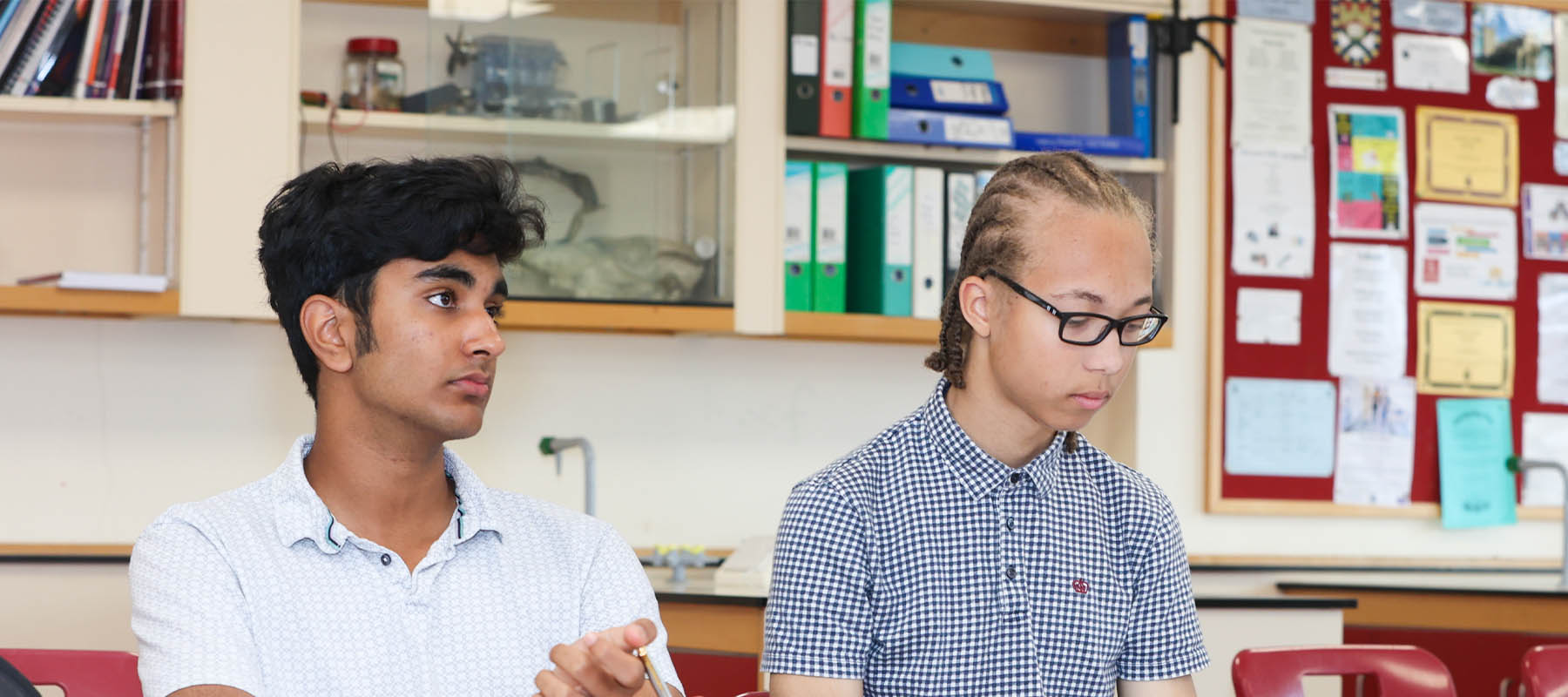Mathematics
The vision of the Mathematics Department is to deliver an educational experience of the highest quality that encourages and develops independent thinking and problem-solving skills, thereby helping students prepare for successful roles in a dynamic world.
The Mathematics Department adopts the White Rose Scheme of Learning at KS3 & KS4. The aim of this course is to develop a culture of deep understanding, confidence, and competence in Maths – a culture that produces strong, secure learning and real progress. No matter what their starting points, we strive to facilitate learners to achieve excellence. We believe everyone can do Maths. As we prove this to pupils, we’re hoping to shape assured, happy and resilient mathematicians who relish the challenge of Maths and become independent, reflective thinkers, whose skills not only liberate them in Maths but also support them across the curriculum. We are committed to working together to be and give the absolute best, and to make a difference to every pupil.
Course Details
The Mathematics Department have decided to adopt a five-year scheme of learning, developed by White Rose Maths, that premised on the concept of mathematics mastery and covers both Key Stage 3 and Key Stage 4.
White Rose Maths – https://whiterosemaths.com/resources/schemes-of-learning/secondary-sols/
Course Description
The aim of this course and the Mathematics Department is to develop a culture of deep understanding, confidence and competence in maths – a culture that produces strong, secure learning and real progress. No matter what their starting points, we strive to facilitate learners to achieve excellence. We believe everynoe can do Maths. As we prove this to pupils, we’re hoping to shape assured, happy and resilient mathematicians who relish the challenge of maths and to become independent, reflective thinkers, whose skills not only liberate them in maths but also support them across the curriculum. We’re committed to working together to be and give the very best, and to make a difference to every pupil.
Programme of Study
Year 7
Term 1
- Algebraic Thinking
- Place Value and Proportion
- Sequences
- Understand and Use Algebraic Notation
- Equality and Equivalence
- Place Value and Ordering Integers and Decimals
- Fraction, Decimal and Percentage Equivalence
Term 2
- Applications of Number
- Directed Number
- Fractional Thinking
- Solving Problems With Addition and Subtraction
- Solving Problems With Multiplication and Division
- Fractions and Percentages of Amounts
- Operations and Equations With Directed Number
- Addition and Subtraction of Fractions
Term 3
- Lines and Angles
- Reasoning With Number
- Constructing, Measuring and Using Geometric Notation
- Developing Geometric Reasoning
- Developing Number Sense
- Sets and Probability
- Prime Numbers and Proof
Year 8
Term 1
- Proportional Reasoning
- Representations
- Ratio and Scale
- Multiplicative Change
- Multiplying and Dividing Fractions
- Working in the Cartesian Plane
- Representing Data
- Tables and Probability
Term 2
- Algebraic Techniques
- Developing Number
- Brackets, Equations and Inequalities
- Sequences
- Indices
- Fractions and Percentages
- Standard Index Form
- Number Sense
Term 3
- Developing Geometry
- Reasoning With Data
- Angles in Parallel Lines and Polygons
- Area of Trapezia and Circles
- Line Symmetry and Reflection
- The Data Handling Cycle
- Measures of Location
Assessment
Assessment is conducted using End of Block tests, End of Term tests and End of Year tests. Students are also assessed every term using the Star Maths computer program.
Home Learning
The Mathematics Department subscribes to two main websites for home learning (alongside the White Rose Maths home learning resources) these are MyMaths and Mathswatch, tasks will be set on these platforms in addition to other tasks set by class teachers.
Where can Mathematics take you
Maths is one of the most respected subjects to achieve a qualification in, and the breadth of applications is immense. Mathematics underpins most of science, technology and engineering and is also important in areas as diverse as business, law, nutrition, sports science and psychology. There are many opportunities to use Maths to make a difference in society, for example through the analysis involved in medical research, developing new technology, modelling epidemics or in the study of patterns of criminal activity to identify trends. Studying Mathematics develops problem solving and logic skills, but also provides opportunities to develop team-working skills, resilience, effective communication and the ability to use your own initiative.
Further Study
GCSE Mathematics
Careers
- Finance– Actuarial Work, Accountancy, Financial Modelling, Investment Banking
- Computing– Games Design, Internet Security, Telecommunications
- Mathematical Biology-Population Modelling, Epidemics and Vaccination
- Engineering– Aircraft Modelling, Fluid Flows, Acoustic Engineering, Quantity Surveyor, Planner
- Teaching and Lecturing
- Statistics– Medical Statistics, Market Research, Government Statistics
- Business– Logistics, Traffic Planning, Project Management, Business Consultancy
How can parents support their child’s learning
- Ensure that your child uses the internet learning tutorials effectively, possibly sitting with them and learning the Mathematics skills together.
- Always try to take opportunities to use Mathematics and problem solving in real life contexts with your child: best buys at the supermarket; exchange rates for currency; conversion of measurements; utility bills; interest repayments on loans, mortgages or interest on investments; percentage increase/decrease; card/dice/board games; code-breaking and so on.
Useful Links
- White Rose Maths – https://whiterosemaths.com/
- Maths Watch – https://vle.mathswatch.co.uk/vle/


